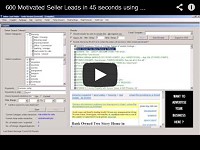Atlanta Real Estate Investors Alliance Blog
Do You Need Help with Reports?
Posted on October 30, 2013 byIt is the goal of this column to answer questions about QuickBooks and how it is used in the REI arena. Know how to record transactions in the proper way and have your set of books in good shape when it comes time for taxes. It is our intention to do this by you the members submitting questions to Karen@SmallBusinessAdvisor.biz, and getting answers here in this column.
Q: P&L report does not match with Sales Report – how do I fix this?
A: An apparent discrepancy between P&L and Sales Reports can trace to one or more of several issues, including, but not limited:
- The accounting bases of the reports do not match.
- Sales items point to incorrect sales accounts
- The P&L report includes transactions that do not use items (e.g. The Expense Tab on a bill or a journal entry).
- List or transaction damage in the company data file. Read More→
How to Make a Website For Fun or Profit – Part 2
Posted on October 30, 2013 byWelcome back! In Part 1 of this article, we covered how crucial it is to have a website if you want to sell/educate/entertain/enlighten/etc. just about anything to anyone in the world in the current century. We also discussed HOW to actually get a FREE, performing website up & running quickly.
Having a free website is great! You get to put some content up for the world to see. You start to learn how to add images, videos, etc. to your site. You can get people to add comments to your site. And you can quickly gain confidence on how all this internet “stuff” works.
This is particularly an attractive option IF you don’t run a “real” business, or if you’re only concerned with sharing your thoughts or ideas with the world. So if you’re happy with that, great! You can stop reading now.
However, if you DO run a legitimate business, or if you’re interested in making money or being perceived as legitimate… or if you want to learn how a true website is made these days, then keep reading! Read More→
Do You Have a Burning Desire to Buy One Hundred Houses per Year? If You Do, Be Sure You Are Prepared!
Posted on October 30, 2013 byRecently I was talking to several of my students who each said they wanted to buy 100 houses next year. These students had listened to one of the gurus who had bought and sold over one hundred houses in one year and is now teaching people how to duplicate what he had done. I listened closely to these bright eyed, inexperienced students tell me they wanted to do the same as the guru, which frightened me to death. Later over dinner, I mentioned what I had just heard to my wife. She encouraged me to tell my tale of woe about the years of agony we experienced because I got too big for my britches and against my wife’s better judgment I had tried to do the same thing myself.
What the students were thinking about doing frightened me because several years before I thought I knew enough about buying and selling houses that I could easily buy 100 houses in a year. I thought it was a noble goal and I clearly believed I could create my fortune in months, not years. At the time the market was right to be able to buy houses at the rate of 100 houses per year. That is why I want to tell my story so every overzealous beginning investor will think before they set about to try to do the same. Read More→
The Goblins Are Coming! Are You Afraid?!?
Posted on October 30, 2013 byAre You Afraid?!?
 Don’t let them scare you! Now of course we don’t get scared by the Goblins on Halloween, but many times we do let the Goblins scare us the rest of the year… scare us away from doing profitable deals.
Don’t let them scare you! Now of course we don’t get scared by the Goblins on Halloween, but many times we do let the Goblins scare us the rest of the year… scare us away from doing profitable deals.
After all, many of us get scared away from potential deals because we think they won’t work for us. Or we don’t know how to structure them correctly and get our agreements in writing. Or we don’t know how to negotiate to achieve a favorable outcome. Or we are simply afraid to talk to sellers our of plain old fear of rejection.
If the Goblins of fear, lack of knowledge, or the difficulty of a deal, or some other Fear Monster is lurking in your mind and is stopping you from finding and closing on a deal, we have the solution for you…
The King of Kitchen Table Negotiators, aka The King of Creative Seller Financing, Larry Harbolt, is teaching a Full Day Workshop this Saturday, November 2nd on creative buying and selling and negotiating deals that others don’t see or know how to structure.
Let Larry help give you the knowledge and confidence you need to tame your Fear Monster so you can make your real estate investments truly profitable for you and your family.
And TODAY is the last day to Take Advantage of the 2-for-1 Early Registration Special before prices go up and become a per person price.
Tom DiAgostino
Posted on October 30, 2013 by Tom DiAgostino grew up the hard way in the Monroe Housing Projects in the South Bronx of New York City. He seized opportunity and started his college career at CUNY and then Pace University, joined the Army ROTC and commissioned as a Second Lieutenant, eventually retiring from the Army. At Pace he did an internship at Reynolds Securities, a financial firm where he achieved a tremendous education in the markets, and has been heavily involved in the trading markets ever since.
Tom DiAgostino grew up the hard way in the Monroe Housing Projects in the South Bronx of New York City. He seized opportunity and started his college career at CUNY and then Pace University, joined the Army ROTC and commissioned as a Second Lieutenant, eventually retiring from the Army. At Pace he did an internship at Reynolds Securities, a financial firm where he achieved a tremendous education in the markets, and has been heavily involved in the trading markets ever since.
His business career started in 1988 as a project manager for Orenstein Construction. It was then he purchased his first batch of Tax Liens through the tax sale process. In 1992, he struck out on his own and formed the company T-GRAM, Inc. an acronym for his bride of 24 years and 4 children, Thomas, Grace, Rick, Ann, & Maegan (he says he is the hyphen). He started as a site builder, then to a developer of small subdivisions, then to a Superior Wall franchise that set over 4,000 homes. Tom has kept current through education and seminars adding new tools to his business practice to stay on top of the ever-changing market place. Tom has been a rehabber, builder, and Tax Sale investor for the last decade. His experiences entail every facet of real estate, and throughout his career he has utilized tax sale properties for rehab projects, wholesales and rentals. Growing wealth by acquiring real estate for pennies on the dollar via Tax Sales is the foundation of Tom’s real estate business in Fortris LLC.
Tom is the Co-Author of Dare to Succeed with The New York Times Best-Selling Author Jack Canfield (Chicken Soup for the Soul). Available now on Amazon.com.
Online Lead Finder Version 2.7
Posted on October 29, 2013 by“You’re About to Discover a Software Tool That Tirelessly Works for You To Find HOT Leads and Create Massive Profits!”
 PLEASE NOTE: If you are an Atlanta REIA Member you can download the software for free by logging in to the Atlanta REIA Members Only Website and navigating to the Members Only Downloads & Bonuses. If you are a Gold Member, follow the instructions in the ReadMe.pdf file on how to activate the Unlimited Gold Edition at NO CHARGE (a $500 value!).
PLEASE NOTE: If you are an Atlanta REIA Member you can download the software for free by logging in to the Atlanta REIA Members Only Website and navigating to the Members Only Downloads & Bonuses. If you are a Gold Member, follow the instructions in the ReadMe.pdf file on how to activate the Unlimited Gold Edition at NO CHARGE (a $500 value!).
 We all know that you can’t do business without leads that you can turn into suspects, prospects, and paying customers. You need lots of leads to work in order to generate your sales, whether it’s real estate, Internet marketing, affiliate marketing, eBay, any other business.
We all know that you can’t do business without leads that you can turn into suspects, prospects, and paying customers. You need lots of leads to work in order to generate your sales, whether it’s real estate, Internet marketing, affiliate marketing, eBay, any other business.
Online Lead Finder provides leads fast! Here’s why you should use this software:
- Cragislist, BackPage, Ebay Lead Search
- Yellow Pages Scraper
- Automated Twitter Marketing
- Twitter Trends Demand Traffic
- Facebook Lead Serve
- Social Lead Detective
- Google Maps Extractor
- Yahoo Auto Answer Bot
- Social Mail Hacker
- Linked Lead Connect
- Email Gunner
Nov 4th Atlanta REIA Meeting with Reggie Brooks on Abandoned House Profits
Posted on October 28, 2013 bywith Special Guest, Reggie Brooks
Guests Can RSVP Online Now for $15 or Pay $20 at the Door.
 PLEASE NOTE: On November 4th, the Atlanta REIA Main Monthly Meeting will be held at the Holiday Inn Atlanta – Perimeter/Dunwoody located at 4386 Chamblee-Dunwoody Road in Atlanta, GA. This is for the November 4th meeting only.
PLEASE NOTE: On November 4th, the Atlanta REIA Main Monthly Meeting will be held at the Holiday Inn Atlanta – Perimeter/Dunwoody located at 4386 Chamblee-Dunwoody Road in Atlanta, GA. This is for the November 4th meeting only. On November 4th at the Atlanta REIA Main Meeting, Reggie Brooks will teach you how to find these abandoned and distressed properties, find the owners, and structure a transaction that is mutually beneficial to both you and the seller. You will learn how to automate the process of finding the properties, the owners and create a profitable business where you get the abandoned properties chasing you, rather than the other way around. Reggie’s “Abandoned Property” presentation includes case studies of people who have used his Abandoned Property System to create huge profits buying and selling these unwanted homes.
On November 4th at the Atlanta REIA Main Meeting, Reggie Brooks will teach you how to find these abandoned and distressed properties, find the owners, and structure a transaction that is mutually beneficial to both you and the seller. You will learn how to automate the process of finding the properties, the owners and create a profitable business where you get the abandoned properties chasing you, rather than the other way around. Reggie’s “Abandoned Property” presentation includes case studies of people who have used his Abandoned Property System to create huge profits buying and selling these unwanted homes.
Join us and you will learn…
- How to make big profits using a unique niche in the marketplace – Abandoned Properties
- How to invest with no cash and no credit
- Insider secrets that the professional investors use to turn $15,000 profits into $50,000 profits and more
- Hot new tips and insights that the professionals use to find profitable deals, especially in today’s market
- Hidden cash producing secrets that even seasoned investors don’t even know
- How to uncover hidden value in properties that most seasoned investors overlook
- How to profit from properties that most investors consider worthless
- How to write your contracts to maximize your profits
- How to use creative financing to fund your deals
- And much, much more!
Come join Reggie and the rest of us at the Atlanta REIA Meeting on Monday, November 4th at 5PM at the Holiday Inn Atlanta – Perimeter/Dunwoody located at 4386 Chamblee-Dunwoody Road in Atlanta, GA to profit from abandoned properties.
 WIN A CRUISE or Other Door Prizes: All participants who attend the Atlanta REIA Meeting will have a chance to win a *Complimentary 2 Day Cruise to the Bahamas with Caribbean Cruise Line! The 2 day Cruise does not include port fees, transportation and taxes. *We will also be giving away other door prizes such as Gift Cards and more! *You must be present at the meeting to win.
WIN A CRUISE or Other Door Prizes: All participants who attend the Atlanta REIA Meeting will have a chance to win a *Complimentary 2 Day Cruise to the Bahamas with Caribbean Cruise Line! The 2 day Cruise does not include port fees, transportation and taxes. *We will also be giving away other door prizes such as Gift Cards and more! *You must be present at the meeting to win.
with Special Guest, Rock Shukoor
 Please join us for the Mobile Real Estate Rockstars Group hosted by Don DeRosa at our “Meeting-Before-The-Meeting” on November 4th at 3:00 PM at Total Wine & More located at 124 Perimeter Center W (see map). Our special guest will be Rock Shukoor, who will showcase his Guerilla Marketing skills and show you how to find at least one deal a day. Yes, I said one deals a day. In fact, Rock wants to show you “7 Ways To Find 7 Great Deals in 7 Days”! Rock will share everything you need to know on how to find deals quickly without using any money. If you have a phone and have access to a computer, you are in business. Rock will teach you all the details on…
Please join us for the Mobile Real Estate Rockstars Group hosted by Don DeRosa at our “Meeting-Before-The-Meeting” on November 4th at 3:00 PM at Total Wine & More located at 124 Perimeter Center W (see map). Our special guest will be Rock Shukoor, who will showcase his Guerilla Marketing skills and show you how to find at least one deal a day. Yes, I said one deals a day. In fact, Rock wants to show you “7 Ways To Find 7 Great Deals in 7 Days”! Rock will share everything you need to know on how to find deals quickly without using any money. If you have a phone and have access to a computer, you are in business. Rock will teach you all the details on…
- Where to find deals
- How to sell them in a flash
- What market to choose
- Where to get your list from
- What kind of properties to focus on
- Where to get the money from for these deals
- How to stay focused on one deal per day
- And much, much more…
Rock even has some special FREE Bonuses for all those who attend!
 The Mobile Real Estate Rockstar Group is an educational and networking group for investors who want to leverage mobile technology to become more competitive, profitable investors. You’ll learn how to use the latest apps, tips and techniques to use the information they need, right now, at their fingertips, from anywhere. At 5:00 PM, Total Wine & More will be offering a complimentary wine tasting to all those who attend our meeting and wish to participate. There is NO CHARGE to attend the meeting or wine tasting for Atlanta REIA Members and guests. Thanks Total Wine & More!
The Mobile Real Estate Rockstar Group is an educational and networking group for investors who want to leverage mobile technology to become more competitive, profitable investors. You’ll learn how to use the latest apps, tips and techniques to use the information they need, right now, at their fingertips, from anywhere. At 5:00 PM, Total Wine & More will be offering a complimentary wine tasting to all those who attend our meeting and wish to participate. There is NO CHARGE to attend the meeting or wine tasting for Atlanta REIA Members and guests. Thanks Total Wine & More!
 After the conclusion of the Main Meeting, we will be reconvening at the Tilted Kilt Perimeter located at 1155-B Mount Vernon Highway in Atlanta for the “Meeting-After-The-Meeting”. The Tilted Kilt will be offering half price appetizers as well as food and drink specials for our members and guests. Come eat, drink, network and have fun with us as hang out late into the night! Thanks Tilted Kilt Perimeter!
After the conclusion of the Main Meeting, we will be reconvening at the Tilted Kilt Perimeter located at 1155-B Mount Vernon Highway in Atlanta for the “Meeting-After-The-Meeting”. The Tilted Kilt will be offering half price appetizers as well as food and drink specials for our members and guests. Come eat, drink, network and have fun with us as hang out late into the night! Thanks Tilted Kilt Perimeter!
*Please Note: Meeting agenda is subject to change.
Each and every month, for the duration of our meeting, we have a Vendor Trade Show in which you can come out and meet many of our participating business members who help sponsor our meeting. Vendors can Reserve a Table Here. Thanks again sponsors!
 Networth Realty of Atlanta, LLC – A licensed, full-service residential wholesale brokerage that specializes in finding quality wholesale properties and making them available to you. Read More>>
Networth Realty of Atlanta, LLC – A licensed, full-service residential wholesale brokerage that specializes in finding quality wholesale properties and making them available to you. Read More>>
 Halperin Lyman, LLC – A transactional real property law firm devoted to providing the full spectrum of non-litigation related real estate legal and consulting services to its clientele.
Halperin Lyman, LLC – A transactional real property law firm devoted to providing the full spectrum of non-litigation related real estate legal and consulting services to its clientele.
Read More>>
 Atlanta Private Lending – Atlanta’s premier private real estate lending company. We provide private, hard money loans to professional real estate investors for renovation and investment purposes. Read More>>
Atlanta Private Lending – Atlanta’s premier private real estate lending company. We provide private, hard money loans to professional real estate investors for renovation and investment purposes. Read More>>
 Goldmine Properties, Inc. – As Atlanta’s first full service real estate wholesaler, we offer wholesale property at 65% loan to value, with financing available. Purchase price and repairs are 65% of certified after repaired appraisal. Read More>>
Goldmine Properties, Inc. – As Atlanta’s first full service real estate wholesaler, we offer wholesale property at 65% loan to value, with financing available. Purchase price and repairs are 65% of certified after repaired appraisal. Read More>>
 Solutions Realty Network – Providing expert property management and investment services since 2003. You invest and we take care of the rest! We’re the solution to all your real estate needs. Read More>>
Solutions Realty Network – Providing expert property management and investment services since 2003. You invest and we take care of the rest! We’re the solution to all your real estate needs. Read More>>
 Advanta IRA Administration – With the help of your local Advanta IRA staff, use your IRA to invest in assets you know, understand and control, such as real estate, notes & mortgages, private placements, and much more! Read More>>
Advanta IRA Administration – With the help of your local Advanta IRA staff, use your IRA to invest in assets you know, understand and control, such as real estate, notes & mortgages, private placements, and much more! Read More>>
 The Small Business Advisor – A full service small business consulting firm specializing in QuickBooks with a wide variety of specialized services, trainings and products for small businesses. Read More>>
The Small Business Advisor – A full service small business consulting firm specializing in QuickBooks with a wide variety of specialized services, trainings and products for small businesses. Read More>>
 Law Office of Fred P. Kross – A law firm specializing residential and commercial real estate closings, short sales, foreclosures, REOs, owner financing, contracts, probate and bankruptcy. Read More>>
Law Office of Fred P. Kross – A law firm specializing residential and commercial real estate closings, short sales, foreclosures, REOs, owner financing, contracts, probate and bankruptcy. Read More>>
 Craftbuilt, Inc. – We are a Metro Atlanta design-build construction firm specializing in whole-structure renovations, restorations, and new construction. No matter what the situation, we are up to the challenge! Read More>>
Craftbuilt, Inc. – We are a Metro Atlanta design-build construction firm specializing in whole-structure renovations, restorations, and new construction. No matter what the situation, we are up to the challenge! Read More>>
 Angel Oak Funding – A direct hard money lender headquartered in Atlanta. We provide renovation/construction loans for investors and or builders to purchase and renovate residential properties. Read More>>
Angel Oak Funding – A direct hard money lender headquartered in Atlanta. We provide renovation/construction loans for investors and or builders to purchase and renovate residential properties. Read More>>
 American IRA – The American IRA mission is to provide the highest level of customer service in the self-directed retirement industry.
American IRA – The American IRA mission is to provide the highest level of customer service in the self-directed retirement industry.
Read More>>
 CRS Data – We offer comps from the MLS & FSBO’s, custom searches, property tax records, interactive maps, sales & mortgage info, real estate valuations, mailing lists & more. Read More>>
CRS Data – We offer comps from the MLS & FSBO’s, custom searches, property tax records, interactive maps, sales & mortgage info, real estate valuations, mailing lists & more. Read More>>
 Atlanta Carpet Services, Inc. – Providing carpet, wood, vinyl, and tile, ACS is dedicated to every aspect of your floor covering needs from initial consultation to the sale and follow-up services. Read More>>
Atlanta Carpet Services, Inc. – Providing carpet, wood, vinyl, and tile, ACS is dedicated to every aspect of your floor covering needs from initial consultation to the sale and follow-up services. Read More>>
 Fuller Center for Housing of Greater Atlanta – A faith-driven, Christ-centered, non-profit organization dedicated to providing adequate shelter for people in need in the Greater Atlanta area. Read More>>
Fuller Center for Housing of Greater Atlanta – A faith-driven, Christ-centered, non-profit organization dedicated to providing adequate shelter for people in need in the Greater Atlanta area. Read More>>
- Bowen’s Specialized Services
- Renovation Construction & Design
- Steelworks Designs LLC
- FirstCall Claims
- World Financial Group
- Air Conditioning Experts, Inc.
- American family Insurance, The Partlowe Agency
- Platinum Key Management, Inc (Rock Shukoor)
- Nationwide Insurance
- Comcast Xfinity (Dylon Ross)
What’s Happening at Atlanta REIA for the Week of October 28, 2013
Posted on October 25, 2013 byWholesaling in the New Economy
Presented by New York Times best-Selling Author, International Speaker, Personal Development Life Coach, and Real Estate Entrepreneur Wahid Shakur aka Mr. Tycoon!
 Whether you are new or just getting back in the game, Mr. Tycoon has news you need NOW in order to be a successful wholesaler in today’s market. Join us at the Atlanta REIA West Meeting on Monday, October 28th at 6:30PM at the Cherokee Cattle Company for a special bonus: “In Order to Get Your Money Right, You Must Get Your MIND Right!”
Whether you are new or just getting back in the game, Mr. Tycoon has news you need NOW in order to be a successful wholesaler in today’s market. Join us at the Atlanta REIA West Meeting on Monday, October 28th at 6:30PM at the Cherokee Cattle Company for a special bonus: “In Order to Get Your Money Right, You Must Get Your MIND Right!”
When: Monday, October 28, 6:30-9:00 pm
Late Night Networking: From 9:00 to 10:00PM
Where: Cherokee Cattle Company, 2710 Canton Rd, Marietta, GA
More Info: Call 678-895-1460
There will be door prizes, fun, great networking! As always, the meeting is free for Atlanta REIA Members and just $5 (CASH ONLY at the door) for non-members. EVERYONE can bring a guest for free this month, so pair on up and ride on in Monday for a great night out. Don’t miss this very special Guest Speaker! See you there!
Hosted by Joe Thompson
 Haves and Wants is a weekly investor’s networking, brainstorming and deal making jam session hosted by Joe Thompson and held every Thursday at 5 Seasons Brewing at the Prado from 1:30 PM till approximately 3:00 PM. This group has been meeting for over 6 years and is all about networking, sharing information, doing deals and making money right now. Be sure to bring lots of your business cards and flyers and be prepared to promote your business and/or your haves, wants and deals with our group. If you are a real estate player or want to be, this is one meeting you don’t want to miss!
Haves and Wants is a weekly investor’s networking, brainstorming and deal making jam session hosted by Joe Thompson and held every Thursday at 5 Seasons Brewing at the Prado from 1:30 PM till approximately 3:00 PM. This group has been meeting for over 6 years and is all about networking, sharing information, doing deals and making money right now. Be sure to bring lots of your business cards and flyers and be prepared to promote your business and/or your haves, wants and deals with our group. If you are a real estate player or want to be, this is one meeting you don’t want to miss!
 5 Seasons Brewing is located at 5600 Roswell Rd (map) inside the Perimeter at the “Prado” in Sandy Springs. The all natural, organic food at the 5 Seasons is excellent and the hand-crafted beer is even better! Come out and eat, drink, network and share your deals with us! There is no charge to attend this meeting for Atlanta REIA Members or guests. Please come early and stay late. We would love to have you!
5 Seasons Brewing is located at 5600 Roswell Rd (map) inside the Perimeter at the “Prado” in Sandy Springs. The all natural, organic food at the 5 Seasons is excellent and the hand-crafted beer is even better! Come out and eat, drink, network and share your deals with us! There is no charge to attend this meeting for Atlanta REIA Members or guests. Please come early and stay late. We would love to have you!
Just Announced. FREE 2 Day Wealth Building Event in Atlanta on December 7 & 8, 2013
Posted on October 25, 2013 byAttend for FREE & Get 2 Awesome Bonuses!
 We are very excited to announce that renowned real estate investor and trainer Dave Lindahl is hosting a 2 Day Wealth Building Event in Atlanta on December 7th & 8th and has invited our members, friends and followers to attend at NO CHARGE. That’s right… FREE! And it gets even better… keep reading to find out about several FREE Bonuses Dave has in store for you for registering and attending…
We are very excited to announce that renowned real estate investor and trainer Dave Lindahl is hosting a 2 Day Wealth Building Event in Atlanta on December 7th & 8th and has invited our members, friends and followers to attend at NO CHARGE. That’s right… FREE! And it gets even better… keep reading to find out about several FREE Bonuses Dave has in store for you for registering and attending…
As I’m sure you’re aware, every economic recovery provides an opportunity to create a lot of wealth in a short period of time. Dave knows this firsthand because it happened to him about 18 years ago during the last major recession. And, while the years have gone by and Dave continued to buy and sell real estate… 7,400+ total units to date… and he has never done as many deals as he did back then or as he is doing now.
Here’s the really exciting news… Dave wants to share with you how he and several other investors did it back then and more importantly… what is working right now, right here in the Atlanta Metro Area… and HOW YOU CAN DO THESE DEALS & CREATE A LOT OF WEALTH TOO!
You’re not only going to get the foundational information and the latest techniques that are working today when you register and attend the event, but you are also going to get Dave’s newly released, PROVEN SUCCESSFUL investing formula that he is making a killing using… and how you can too! Dave’s newly released formula shows you exactly… How to profit big in today’s recovering real estate market.
Register for the FREE live 2-day event in Atlanta, GA so you can discover…
- How to quickly put $10,000-$30,000 in your pocket to start getting your financial life in order
- How to set up your real estate business
- How to fund your deals without using a penny of your own money
- How to avoid dealing with tenants except to cash their checks
- How to use little known techniques to get motivated sellers calling you
- And much, much more! Click here to learn more about the event!
 Also, if you Register Now you can immediately download Dave’s new report on “27 Ways to Buy Properties with No Money Down” and get his Wealth Kit for FREE (Valued at $704) when you attend the event. Register Now to take advantage of these free bonuses while they are available.
Also, if you Register Now you can immediately download Dave’s new report on “27 Ways to Buy Properties with No Money Down” and get his Wealth Kit for FREE (Valued at $704) when you attend the event. Register Now to take advantage of these free bonuses while they are available.
Abandoned Properties Workshop with Reggie Brooks on November 16, 2013
Posted on October 24, 2013 byAbandoned Properties Workshop
Learn How You Can Make $10,000
in CASH in the Next 60 Days!
A Full Day Training Workshop with Reggie Brooks
Sat, Nov 16th – Crowne Plaza Ravinia, Atlanta, GA
Are you “too busy” like so many others, earning a living, to actually make money and become wealthy? There’s nothing wrong with working hard to make an honest living, but it’s not the way to get rich. Isn’t it time that you started making yourself rich, for a change? I won’t kid you though… you do initially have to do some hard work and put your heart into making a lasting change. The good news is, if you attend my upcoming workshop, follow my instructions and stay determined and focused, it can and will happen for you.
 My name is Reggie Brooks and I am an international trainer, author, coach and an active real estate investor. On Saturday, November 16th at the Crowne Plaza Ravinia located at 4355 Ashford Dunwoody Rd in Atlanta, GA, I will be teaching a Full Day Workshop with Atlanta REIA on “How to Make Big Profits with Abandoned Properties” where I will teach you how you can make $10,000 cash in the next 60 days.
My name is Reggie Brooks and I am an international trainer, author, coach and an active real estate investor. On Saturday, November 16th at the Crowne Plaza Ravinia located at 4355 Ashford Dunwoody Rd in Atlanta, GA, I will be teaching a Full Day Workshop with Atlanta REIA on “How to Make Big Profits with Abandoned Properties” where I will teach you how you can make $10,000 cash in the next 60 days.
I will teach you how to find these abandoned and distressed properties, find the owners, and structure a transaction that is mutually beneficial to both you and the seller. You will learn how to “automate the process” of finding the property and the owners, thus creating a cookie-cutter type business where you get the abandoned properties “chasing you”, rather than the other way around.
My “Abandoned Property” training includes case studies of people who have used my Abandoned Property System and made very significant profits.
You Will Learn…
- How to make big profits using a unique niche in the marketplace – Abandoned Properties
- How to invest with no cash and no credit
- Insider secrets that the professional investors use to turn $15,000 profits into $50,000 profits and more
- Hot new tips and insights that the professionals use to find profitable deals, especially in today’s market
- Hidden cash producing secrets that even seasoned investors don’t even know
- How to uncover hidden value in properties that most seasoned investors overlook
- How to profit from properties that most investors consider worthless
- How to write your contracts to maximize your profits
- How to use creative financing to fund your deals
More of What You Will Learn…
- How to make offers on shadow inventory (bank owned property that the bank has not yet listed with a Realtor)
- How to buy real estate well below market value
- Why the bank’s loss is your gain
- How to locate distressed properties
- How to research and evaluate foreclosure properties
- How to calculate your profits
- And much more…
I have been working for years to instruct and coach literally thousands of students to achieve financial freedom. On Saturday, November 16th, I am conducting a full day class in which I will teach you how to capitalize on this ever changing real estate market. Yes, you can still make big money – especially now!
Wahid Shakur
Posted on October 23, 2013 by Internationally-renowned Motivational Speaker, Personal Development Coach, Investment Real Estate Guru, and Entrepreneur of Success, Wahid Shakur, aka “Mr. Tycoon”, is legendary for his “tough but fair” deal-making and negotiation skills. His bestselling book, “Success Is Not A Secret, It’s A System,” extracts the lessons he learned on the road to building his successful real estate investment company and personal fortune, and is the “must-have” guidebook to achieving financial and personal success.
Internationally-renowned Motivational Speaker, Personal Development Coach, Investment Real Estate Guru, and Entrepreneur of Success, Wahid Shakur, aka “Mr. Tycoon”, is legendary for his “tough but fair” deal-making and negotiation skills. His bestselling book, “Success Is Not A Secret, It’s A System,” extracts the lessons he learned on the road to building his successful real estate investment company and personal fortune, and is the “must-have” guidebook to achieving financial and personal success.
Initially begun his life journey in Real Estate, Mr. Tycoon continue to oversee the management of a multi-million dollar real estate investment empire which includes both commercial and residential real estate holdings, educational tools and seminars, private consultation as well as personal coaching. Having mentored by famous Ron LeGrand, Tony Robbins, Marshall Sylver and Stephen Pierce, Mr. Tycoon is a true product of mentorship and success. Having developed his own brand and prowess in motivating, educating as well as inspiring people to achieving their financial freedom as well as their life goals and recognizing the need for personal development as well providing guidance and inspiration to people from all walks of life, Mr. Tycoon is heeding the call and has developed his own personal development strategy along with his Life Coach, Wife and Life Partner, Coach Janese. Read More→
The Objective is a Written Offer
Posted on October 22, 2013 byA common mistake made by real estate investors is to forget why they knock on the seller’s door. By “forget,” I don’t mean the seller answers the door and the investor stands there with a stupid, lost look on his face. I mean the investor doesn’t understand the basic objective of why he’s there.
Do you know the ultimate objective of meeting with sellers? I mean, why are you there? What’s the purpose? Is it to be given a tour of the seller’s house?
Recently, I was working with a couple of investors. By “working,” I mean I was watching and critiquing – the investors had the lead and were responsible for what happened in the house. We went in the first seller’s house and got the grand tour. In the end, the investors told the seller they’d get back with him, then left. Same thing happened in the second seller’s house.
One of the hardest things about teaching is for the teacher to keep his mouth shut. Oh, do I ever have a problem with this! Not immediately correcting someone when they’re doing something wrong practically makes my eyes bleed.
Before going in the third seller’s house, I asked the investors, “When y’all are all done talking to the seller and are ready to leave, will you please ask if I have anything else to add?” Read More→


